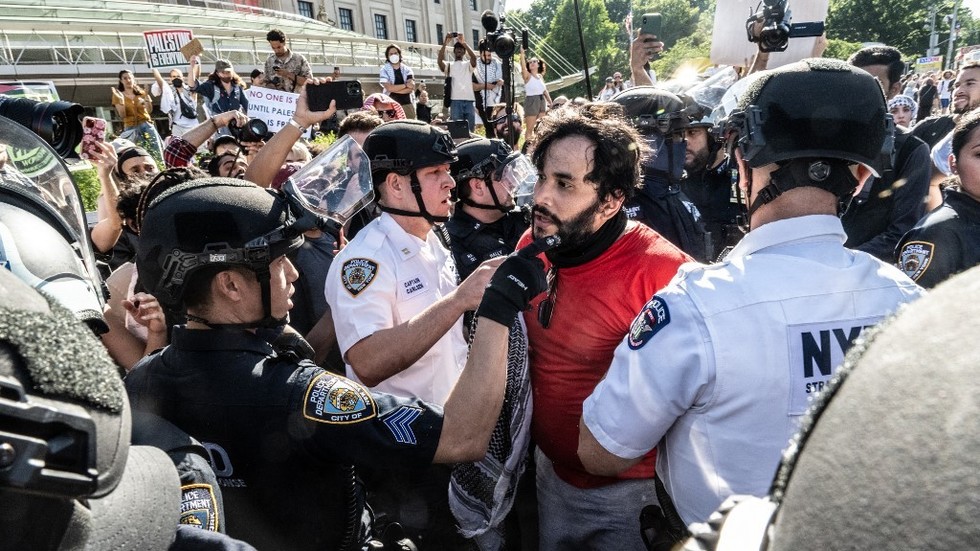WASHINGTON, DC: The United States, Japan and South Korea “strongly oppose” any unilateral attempts to change the status quo in the Indo-Pacific waters and “strongly condemn” North Korea’s recent launches using ballistic missile technology, Voice of America reported.
A joint statement of the three countries followed a meeting of US Deputy Secretary of State Kurt Campbell with Japan’s Vice Foreign Minister Masataka Okano and South Korea’s Vice Foreign Minister Kim Hong Kyun in Little Washington, Virginia, on Friday.
The officials agreed to continue close coordination on North Korea and other challenges to regional and global stability, with a plan to set up a new coordinating body to further align their policies.
US Deputy Secretary of State Campbell ahead of the meeting at his farmhouse said that the envisioned body will likely be “a secretariat of some kind,” Kyodo reported.
The three allies recognized the importance of “opposing unlawful maritime claims in the South China Sea” and reaffirmed the importance of maintaining peace and stability across the Taiwan Strait. “There is no change in our basic positions on Taiwan, and we call for the peaceful resolution of cross-strait issues,” the joint statement said.
On Friday, North Korean leader Kim Jong Un supervised an artillery demonstration drill of “super-large multiple rocket” launchers aimed at South Korea, Pyongyang state media said on Friday.
The development comes a day after South Korea said North Korea fired about 10 short-range ballistic missiles into the Sea of Japan on Thursday and days after an unsuccessful satellite rocket launch by Pyongyang.
North Korea has been pursuing its nuclear and missile programmes despite criticism by the US, Japan, South Korea and other regional allies and partners.
The United States has condemned North Korea’s May 27 and May 29 launches using ballistic missile technology, which it said is “in direct violation of multiple UN Security Council resolutions (UNSCRs).”
These launches, it said, continue North Korea’s “reckless behaviour,” “which poses a grave threat to the Korean Peninsula, the region, and international peace and security and undermine the global non-proliferation regime,” the US State Department said.
Meanwhile, the US and Japan have emphasized the significance of the “new era of strategic global cooperation” between Washington and Tokyo, State Department spokesperson Matthew Miller said in a statement
Campbell on Friday also met with Japanese Vice Minister of Foreign Affairs Okano Masataka and USAID Deputy Administrator Isobel Coleman in Washington, DC for the first US-Japan Strategic Diplomacy and Development Dialogue.
US President Joe Biden and Prime Minister Kishida had announced the Dialogue during the latter’s visit to Washington DC on April 10.
The two countries reinforced US and Japanese commitments to collaborate with developing partners to address shared challenges. They also stressed the importance of quality infrastructure and sustainability for driving economic prosperity for all.
A joint statement of the three countries followed a meeting of US Deputy Secretary of State Kurt Campbell with Japan’s Vice Foreign Minister Masataka Okano and South Korea’s Vice Foreign Minister Kim Hong Kyun in Little Washington, Virginia, on Friday.
The officials agreed to continue close coordination on North Korea and other challenges to regional and global stability, with a plan to set up a new coordinating body to further align their policies.
US Deputy Secretary of State Campbell ahead of the meeting at his farmhouse said that the envisioned body will likely be “a secretariat of some kind,” Kyodo reported.
The three allies recognized the importance of “opposing unlawful maritime claims in the South China Sea” and reaffirmed the importance of maintaining peace and stability across the Taiwan Strait. “There is no change in our basic positions on Taiwan, and we call for the peaceful resolution of cross-strait issues,” the joint statement said.
On Friday, North Korean leader Kim Jong Un supervised an artillery demonstration drill of “super-large multiple rocket” launchers aimed at South Korea, Pyongyang state media said on Friday.
The development comes a day after South Korea said North Korea fired about 10 short-range ballistic missiles into the Sea of Japan on Thursday and days after an unsuccessful satellite rocket launch by Pyongyang.
North Korea has been pursuing its nuclear and missile programmes despite criticism by the US, Japan, South Korea and other regional allies and partners.
The United States has condemned North Korea’s May 27 and May 29 launches using ballistic missile technology, which it said is “in direct violation of multiple UN Security Council resolutions (UNSCRs).”
These launches, it said, continue North Korea’s “reckless behaviour,” “which poses a grave threat to the Korean Peninsula, the region, and international peace and security and undermine the global non-proliferation regime,” the US State Department said.
Meanwhile, the US and Japan have emphasized the significance of the “new era of strategic global cooperation” between Washington and Tokyo, State Department spokesperson Matthew Miller said in a statement
Campbell on Friday also met with Japanese Vice Minister of Foreign Affairs Okano Masataka and USAID Deputy Administrator Isobel Coleman in Washington, DC for the first US-Japan Strategic Diplomacy and Development Dialogue.
US President Joe Biden and Prime Minister Kishida had announced the Dialogue during the latter’s visit to Washington DC on April 10.
The two countries reinforced US and Japanese commitments to collaborate with developing partners to address shared challenges. They also stressed the importance of quality infrastructure and sustainability for driving economic prosperity for all.




















Discussion about this post